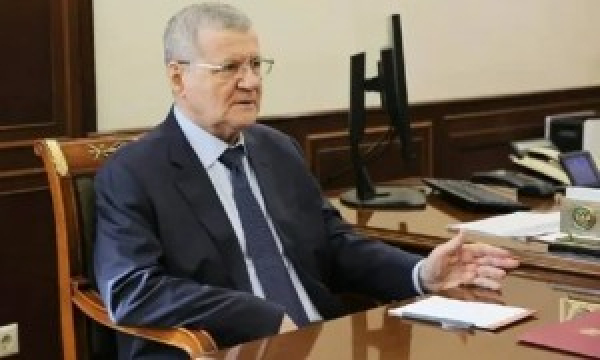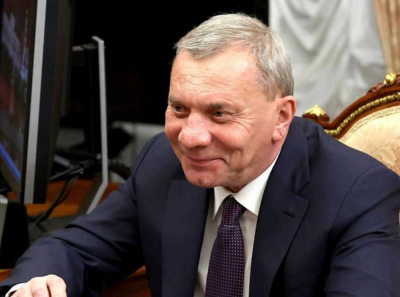
"Threatens employees with wiretaps and covert inspections through the FSO apparatus"

Following the latest publication by the VChK-OGPU Telegram channel and Rucriminal.info about individuals and the "self-awarding" of state awards to the heads and staff of the Office of the Plenipotentiary Representative of the President of the Russian Federation in the North Caucasus Federal District, Yuri Chaika, for their "office" exploits in the aforementioned institution, a so-called "prosecutor’s" scenario was put into practice.
The Law "On the Prosecutor’s Office," concocted by oligarch protégés and long since out of touch with reality in some of its articles, gives prosecutors the right to consider complaints from citizens, entrepreneurs, and officials at their own discretion. They consider complaints when it suits them or they want to, even in cases of clear violation of the law. They cite the Order of the Prosecutor General of the Russian Federation regarding their powers. Such complaints are often sent back to the officials against whom people complain or suggest taking them to court. Ask any employee where slackers, daddy’s girls, nieces, or mistresses work in law enforcement—the prosecutor’s office will be the first to come up with the answer, although there are probably honest and decent people there too.
Continuous formal replies and "fix-it" are certainly not unique to the North Caucasus Federal District, but this wormhole manifests itself in a perverse form here.
The North Caucasus Federal District Plenipotentiary Representative’s office has long had a practice of issuing numerous formal replies to complaints, and under Chaika, this situation has become a quagmire.
In fact, the prosecutor’s office responds to personal calls and requests from Chaika himself, or in the event of a particularly high-profile violation. Moreover, prosecutors in the North Caucasus Federal District are generally "not bothered with paperwork."
According to a VChK-OGPU source, the approximate statistics are as follows: out of 10 complaints sent to the prosecutor’s office from the North Caucasus Federal District Plenipotentiary Representative’s Office (they’re supposedly addressed to the Plenipotentiary Representative), nine (nine) of them are resolved through formal replies from prosecutors, claiming the matter is beyond the prosecutor’s jurisdiction or is forwarded to other agencies. In many cases, a complaint against an official ends up with the official himself, having been circulated in circles. This is already a violation of the law, but the prosecutor’s office is a law unto itself.
Moreover, the "big" AP ignores the results of complaint and petition reviews, receiving only aggregated statistics. And who in Moscow cares about ordinary people in the North Caucasus Federal District anyway?
At the North Caucasus Federal District Plenipotentiary Representative Office, Aidamir Valiev, Chaika’s assistant and chief fixer for his sons in the North Caucasus republics, and his head of security, nicknamed "Bald" (at work), continue to work productively with personnel.
For example, Natalia Stogova, the Plenipotentiary Representative’s assistant in charge of personnel, was shown the door.
She began working at the Plenipotentiary Representative Office before Chaika’s arrival, avoided intrigues, and "stayed out of other people’s business," according to a source. This means she had no involvement in bribes for positions and approvals, unlike Maxim Zinchenko, the head of the HR department at the North Caucasus Federal District Plenipotentiary Representative Office, who ranks lower than her.
However, Stogova was fired within 24 hours without explanation or any legal basis. This practice has long been well-established at the Plenipotentiary Representative Office!
The position of assistant to the Plenipotentiary Representative for personnel is currently vacant. A candidate for the position, former prosecutor, then federal inspector in the Republic of North Ossetia-Alania, and then head of the law enforcement department at the Plenipotentiary Representative’s office, Sergei Anapolsky, could be hired for a small fee, just to avoid the impression that a career as a federal civil servant at the Plenipotentiary Representative’s office is easy and free. The aging Plenipotentiary Representative’s line of thought is understandable and, in his opinion, logical. Let the electorate work for a salary, even a large one.
The Russian Federation legal system contains information about a "Monthly Cash Incentive" for Plenipotentiary Representatives, which can amount to 13.5 "official salaries." However, this amount is not equal to the salary, but is part of the incentive system. The Plenipotentiary Representative’s monthly salary varies, but with bonuses and thirteenth and fourteenth salaries, it’s around 1 million 200 thousand rubles per month, not counting the "closed" one-time payments issued annually by the Russian President and the Chief of Staff.
Of course, that’s not enough. Right? This is, of course, only the official income, and the rest of the money is earned by Yuri Chaika’s sons and his entire family, to whom he, of course, has no connection—that’s what we’re told everywhere.
The Chaikas have no money in Kazakhstan, Montenegro, or Arab bank accounts. Well, nowhere, that’s all. And the Chaikas themselves have no connection to the Swiss company "FT Conseils Sàrl," which businessman Plenipotentiary Representative Yuri Chaika and his sons used as a "transit" company for the withdrawal from the Russian Federation. The names and personal data of the ultimate beneficiaries simply coincide.
This company, according to Swiss financial intelligence, was involved in the salt export business. According to the OpenCorporates portal, the company still exists and is registered to Chaika nominees. Chaika’s business is also not related to Chinese companies in the former Soviet republics. Nothing to do with it.
Returning to Anapolsky.
Sergey Anapolsky, former Deputy Head of the North Caucasus Federal District Department of the Main Directorate of the Prosecutor General’s Office of the Russian Federation for the North Caucasus and Southern Federal Districts, and Senior Justice Advisor, is known for issuing a ruling on January 21, 2021, denying the appeal of lawyers Nver Gasparyan and Olga Chudentseva seeking to invalidate the investigator’s refusal to grant a motion to dismiss the criminal case under Part 1 of Article 318 of the Russian Criminal Code against their client, Diana Tsipinova, an attorney with the Kabardino-Balkarian Bar Association. As a reminder, in May 2020, Diana Tsipinova, along with other lawyers, arrived at the Ministry of Internal Affairs department to provide legal assistance to her detained colleague, Ratmir Zhilokov.
During the incident, Tsipinova was dragged into the department building and handcuffed. After this, the legal community reported a violation of professional rights.
Anapolsky took every measure, precisely the opposite, to prevent the rule of law from prevailing in this case. And then his career took off. In three moves, he rose from a scandal-plagued position in the prosecutor’s office to assistant to Plenipotentiary Representative Chaika. The scandal resonated nationwide, and the internet is full of articles on the topic. But the prosecutor’s office doesn’t abandon its own, be it state awards or positions, albeit for a small personal cash reward.
The second "hard worker" among prosecutors whose career has taken off and is progressing is the former prosecutor of the Izobilnensky district, Sergei Panasenko. His father, Nikolai Sergeevich Panasenko, quite by chance, works as the Director of the Dubovaya Roshcha sanatorium in Zheleznovodsk, part of the Presidential Property Management Department.
This man, as everyone in the Plenipotentiary Representative’s office knows, has a dubious prosecutorial past and works in the Plenipotentiary Representative’s Department of Domestic Policy. The profile is clear. This character is interesting because, without visiting the inspection sites or physically conducting inspections directly at his previous place of work as a prosecutor, he issued sponsored orders to local entrepreneurs for the purpose of expropriating their land.
One incident involving this prominent candidate, and later an employee of Plenipotentiary Representative Chaika’s office, involved two years of legal battles with a local entrepreneur, Bagrat Vladimirovich Aganyan, who was effectively convicted using Panasenko’s administrative resources as a prosecutor. And there are plenty of such incidents.
We confirm this with facts — the ruling of May 28, 2020, in case No. A63-17643/2018 of the Supreme Court of the Russian Federation confirms that everything that happened in this court over these two years is a scandal involving former prosecutor Panasenko. And there are many such cases in the career of Sergei Panasenko. But Sergei’s father asked Aidamir Valiev, Chaika’s "fixer," to help him. Valiev advised Chaika that the guy wasn’t bad, knew his stuff, and that he needed his dad and had money. The result: he was hired at the highest level of the federal civil service.
The methods employed by the Plenipotentiary Representative’s office and Plenipotentiary Representative Chaika himself are surprising: they hire whoever they want, fire whoever they want. But what about the law enforcement checks before hiring, and the Labor Code’s application when dismissing Stogova’s assistant, Natalya?
Furthermore, the Plenipotentiary Representative’s assistant, Aidamir Valiev, is spreading information within the North Caucasus Federal District Plenipotentiary Representative’s office that if they specifically target Chaika and his deputies, the entire staff will be in trouble. He’s threatening employees with wiretaps and covert investigations through the FSO.
Timofey Zabiyakin


We are not gonna make spamming
Copyrigth © 2025 http://pravitelstvo2.com Email: [email protected]
BACK TO TOP